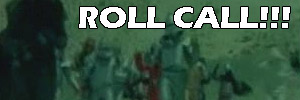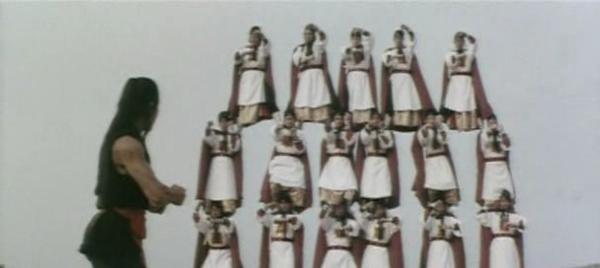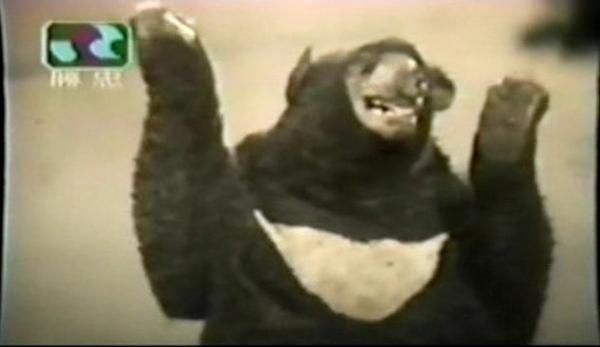Little Hero
aka 諸葛四郎大鬥雙假面 aka Zhu Ge Si Lang da dou shuang jia mian

1978![]()
Written by Cheung San-Yee and Wu Yueh-Ling
Directed by Chan Hung-Man
 |
|
This is why Octomom shouldn’t keep her kids!
|
Polly Shang Kuan beats the fuck out of every phallus in China while transcending gender herself in Little Hero. This statement of fact comes thanks not only to the subtextual and overt piles and piles of dongs and balls, but by her obviously female character entirely referred to as “him”. How much of this is dubbing and how much is present in the original Taiwanese version becomes irrelevant, as we celebrate what the film has become thanks to its transformational event. Little Hero‘s evolution to a perfected form via weird dubbing is not a unique event, but it’s one of my favorite examples of a film improved by the dubbing (this is also conjecture as I’ve not seen the Mandarin-language original, it might be just as fun, but I do not think it can surpass the dubbed version.)
Polly Shang Kuan is no stranger to gender bending cinema, she often plays characters that are disguised as men, are tomboys, and occasionally actually are men. There is even historic precedence for that, with actresses playing male roles in Chinese films and operas since near the beginning of cinema in Asia (and became an interesting parallel to the old opera troops where every role was played by men!) Polly Kuan played characters disguised as men in both serious martial arts dramas and in goofy action comedies. Little Hero leans heavy towards the latter, with increasingly ridiculous villains and gimmicks as the Devil’s Gang breaks out all the stops to try to keep Polly’s character Chu-Kwok Su-Lan from breaking their whole organization.
Chu-Kwok Su-Lan is referred to by every character as a male, despite being Polly Shang Kuan, wearing women’s clothes (and makeup and hair!), and having the male lead obviously attracted to him. It is interesting that Chu-Kwok continually calls male opponents ugly and said other things in regards to their looks, something they wouldn’t really care about unless Chu-Kwok was really a girl. This is one way in which Polly’s character moves beyond gender, he can equally lob insults that would be delivered by a male or by a female, and the villains respond appropriately. The same insults are lobbed at the female villain, who returns the same reaction as the men. The distinction between male gaze and female gaze has been knocked askew. I’m going to follow their examples and be consistent by calling Chu-Kwok Su-Lan male throughout the rest of the review and recap.
Things become a subtext labyrinth when the fighting kicks in. The battles are over two magical swords owned by a family (the magic swords being their own phallic symbols), which involves characters battling it out. At one point the heroes are ambushed by a avalanche of huge stone balls, and some of the huge stone balls have people inside who begin to fight the heroes. And the villains in the balls are crushed to death by other huge stone balls.
Another villain takes up the stylings of an elephant, including two huge tusk weapons and a giant elephant head “tattooed” onto his chest. When you see a closeup of the elephant head, it is clearly sporting a giant dong where its trunk should be. At one point Chu-Kwok Su-Lan beats the tar out of him, then becomes angry at his gyrating elephant penis drawing as it moves around when his fat belly breathes up and down, so he stomps on the Elephant Guy’s tummy, gleefully dancing and stomping on this representation of patriarchal penile power.
Speaking of representations of penii, during the final showdown portion of Little Hero, two octopi emerge from the sea to battle Chu-Kwok Su-Lan. Each octopus is obviously a guy in a rubber suit, but are presented as actual trained octopi. And you don’t have to be Freud to understand the eight tentacles the octopi each have are eight nice phallic symbols for Polly Sheng Kuan to battle. And battle she does, stabbing and slicing off several of them! There is even a repeat of imagery where Chu-Kwok stomps on the heads of both octopi simultaneously, their bodies cut off just enough that it looks like Chu-Kwok is stomping on a giant gross ball sack! The octopi exhibit further powers – squirting both water and ink at their enemies (one of Chu-Kwok’s students gets blasted right in the face with ink!) In a final rejection of the feminine way, the octopi begin launching their own children at Chu-Kwok as weapons. This renunciation of motherhood is extreme, the octopi trained to treat their own offspring as expendable, as if they were no better than sperm flying out into the void.
Chu-Kwok Su-Lan is awesome and fierce. An orphan child who gets involved in all the martial intrigue has heard of Chu-Kwok before he’s met him, and speaks of him as his big brother. Once he finds out who Chu-Kwok really is, the kid follows him throughout the film, dressing like Chu-Kwok (by wearing male-ized versions of Polly Shang Kuan’s wardrobe!) and declaring he’s going to be just like him. Chu-Kwok has a sort of love interest in Woo Ching Ping, but it is practically platonic (despite Polly Shang Kuan obviously laying on the charm) and he calls Woo Ching Ping his “best partner”.
Little Hero suffers from the plot being hard to determine, even considering that it will be wacky and full of gimmicks. Characters will declare they are about to do something, then do something else before getting around to what they were so urgently preparing to do. The intrigue is complicated, but all boils down to someone being jealous an old guy won’t die fast enough so they can become a legend.
For more fun Polly Shang Kuan films, be sure to check out The Zodiac Fighters, The Eighteen Jade Arhats,Shaolin Traitorous, and the Polly Shang Kuan-centric Infernal Brains Podcast episode!

|























